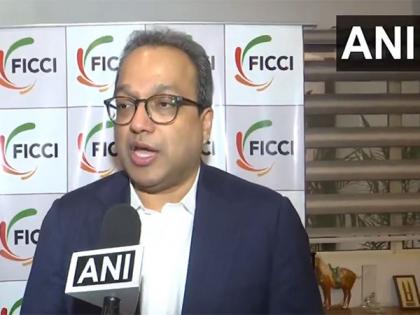"It is a landmark step": FICCI on Govt's Rs 1,500 crore Incentive Scheme to promote Critical Mineral Recycling in country
By ANI | Updated: September 4, 2025 18:05 IST2025-09-04T18:04:01+5:302025-09-04T18:05:17+5:30
New Delhi [India], September 4 : The Federation of Indian Chambers of Commerce and Industry (FICCI) President, Harsha Vardhan ...

"It is a landmark step": FICCI on Govt's Rs 1,500 crore Incentive Scheme to promote Critical Mineral Recycling in country
New Delhi [India], September 4 : The Federation of Indian Chambers of Commerce and Industry (FICCI) President, Harsha Vardhan Agarwal, lauded the government's decision to approve the Rs 1,500 crore Incentive Scheme to promote Critical Mineral Recycling in the country and termed it a "landmark step."
"It is a landmark step by the government. From the industry perspective, we are very positive and bullish about the step, the government has taken," Agarwal said.
The Union Cabinet, chaired by Prime Minister Narendra Modi, on September 3, approved a Rs 1,500 crore Incentive Scheme to develop recycling capacity in the country for the separation and production of critical minerals from secondary sources.
This scheme is part of the National Critical Mineral Mission (NCMM), which is aimed at building the domestic capacity of and supply chain resilience in critical minerals.
The critical mineral value chain, comprising exploration, auction and mine operationalisation, and acquisition of foreign assets, has a gestation period before it can supply critical minerals to the Indian industry.
A prudent way to ensure supply chain sustainability in the near term is through the recycling of secondary sources.
The Scheme will have a tenure of six years from FY 2025-26 to FY 2030-31.
Eligible feedstock is e-waste, Lithium Ion Battery (LIB) scrap, and scrap other than e-waste & LIB scrap, e.g. catalytic converters in end-of-life vehicles. Expected beneficiaries will be both large, established recyclers, as well as small, new recyclers (including start-ups), for whom one-third of the scheme outlay has been earmarked. The Scheme will be applicable to investments in new units as well as expansion of capacity/modernisation, and diversification of existing units.
The Scheme will provide an incentive for the recycling value chain, which is involved in the actual extraction of critical minerals, as opposed to the value chain involved only in black mass production.
The incentives under the Scheme will comprise 20 per cent Capex subsidy on plant & machinery, equipment and associated utilities for starting production within the specified timeframe, beyond which a reduced subsidy will be applicable; and Opex subsidy, which will be an incentive on incremental sales over the base year (FY 2025-26), viz., 40 per cent of eligible Opex subsidy in the 2nd year and balance 60 per cent in the 5th year from FY 2026-27 to FY 2030-31 on achievement of specified threshold incremental sales.
To ensure a greater number of beneficiaries, the total incentive (Capex plus Opex subsidy) per entity will be subject to an overall ceiling of Rs 50 crore for large entities and Rs 25 crore for small entities, within which there will be a ceiling for Opex subsidy of Rs 10 crore and Rs 5 crore, respectively.
In terms of key outcomes, the Scheme incentives are expected to develop at least 270 kiloton of annual recycling capacity, resulting in around 40 kiloton of annual critical mineral production, bringing in about Rs 8,000 crore of investment and creating close to 70,000 direct and indirect jobs.
Several rounds of consultations with industry and other stakeholders have been held through dedicated meetings, seminar sessions, etc., before formulating the Scheme.
The Union Cabinet in January 2025 approved the launch of the National Critical Mineral Mission (NCMM) with an expenditure of Rs 16,300 crore and an expected investment of Rs 18,000 crore by Public Sector Undertakings.
Disclaimer: This post has been auto-published from an agency feed without any modifications to the text and has not been reviewed by an editor
Open in app